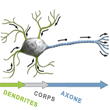Monday, 14 October 2013
Axons Play Unexpected Role in Processing Information

Recently, someone asked me whether it would be fair to say that the integration of all the information that one neuron receives from other neurons takes place in its dendrites. I replied that according to the classic model of neural communication, that is certainly the case, but that processes in living organisms are highly complex, so I probably shouldn’t make that statement categorically, if only because some integration also occurs directly in the neuron’s cell body.
And little did I know how truly I had spoken, if a study that I came across just a few days later is to be believed. That study shows that a neuron’s axon—the long extension through which it connects to other neurons—can also modulate its signal, in a certain way. That is surprising, to say the least, because neural conduction along the axon is considered an “all-or-nothing” phenomenon, which would not seem to leave much room for the possibility of signal modulation.
Except maybe as regards the threshold above which the neuron will trigger a nerve impulse (or action potential) that travels down the axon. And precisely what the researchers found in this study was that this threshold is cut in half when nicotine is applied to the axon. Nicotine is a plant-derived chemical that binds to the same receptors as acetylcholine, a neurotransmitter that occurs naturally in the brain. These nicotinic acetylcholine receptors are located at various place in the nervous system, including the axons. Before this study, neuroscientists knew that the axons had such receptors, but did not have a very clear idea of their function.
This study, conducted on axons connecting the thalamus to the cortex in the auditory system of mice, showed that when nicotine binds to these receptors on these axons, it substantially lowers their threshold for triggering nerve impulses. It is therefore quite possible that this lowering of the axon’s excitability threshold increases the sensory (in this study, auditory) stimulation that reaches the cortex, where the individual becomes aware of it.
This mechanism thus provides a highly plausible explanation for a phenomenon very familiar to people who smoke cigarettes: nicotine enhances certain aspects of cognitive function. Many specialists believe that poor communication between the thalamus and the cortex may contribute to the cognitive problems experienced by people with schizophrenia, so in light of this study, it is not so surprising that some 90% of them smoke. This habit of course has serious consequences for their overall health, but it may possibly be their way of self-medicating for their neural-communication problems.
![]() Brain cells work differently than previously thought
Brain cells work differently than previously thought
![]() Live wires: axons can influence nerve impulses
Live wires: axons can influence nerve impulses
![]() Nicotinic control of axon excitability regulates thalamocortical transmission
Nicotinic control of axon excitability regulates thalamocortical transmission
![]() Nicotinic Modulation of Tone-Evoked Responses in Auditory Cortex Reflects the Strength of Prior Auditory Learning
Nicotinic Modulation of Tone-Evoked Responses in Auditory Cortex Reflects the Strength of Prior Auditory Learning
From the Simple to the Complex | Comments Closed








